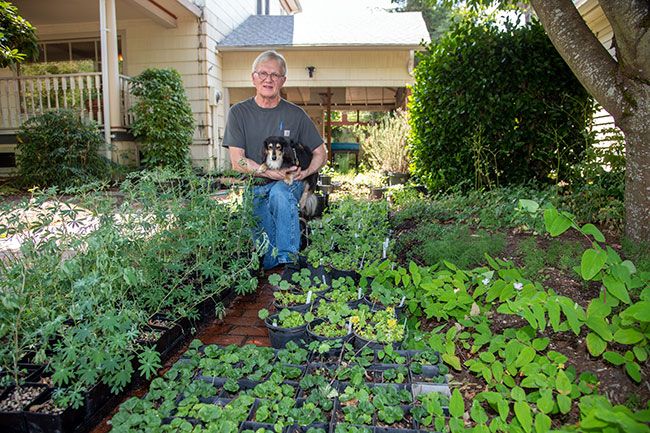Stopping By: Encouraging respect for Oregon’s native plants

Tim McDaniel is a native of McMinnville who grew up as part of the McDaniel Seed Company family. He’s been in the area for many, many years.
But his time here is short compared to the native plants he loves, cares for and propagates. Flora such as camas, sidalcea (checkermallow) and clarkia (a member of the primrose family) have been growing in the Willamette Valley for centuries, maybe millennia.
McDaniel, who has farmed, worked as a farm consultant and is a professional landscape designer and architect, noticed these species and other native plants at the edges of fields and in ditches.
“What are those nifty little plants?” he asked.
Curious, he started reading about “hundreds and hundreds” of native species. The more he learned, the more fascinated he became.
Today, he said, he encourages others to understand and respect Oregon’s native plants, and to use them in their landscapes, as well. He collects and prepares seeds, markets them through his website, or grows them into plants that he sells at pop-up events on the third Saturday each month.
His next event is Saturday, July 15, at 326 N.E. Sixth St., McMinnville. He will be on hand to talk about native plants with visitors.
“There’s an ecological and economic basis for native plants to be more widely understood and used,” McDaniel said.
Some are edible — miner’s lettuce, for instance. Most are lovely, although their blossoms may not be as showy as hybrids bred specifically for large, perfect blooms. Many fit nicely into garden design, especially the Japanese-influenced, nature derived design McDaniel favors.
All are important to the soil and the ecosystem, he said. They work together to feed the rhizosphere, the area where soil and roots meet.
Just beneath the surface, he said, there’s a lively community. For instance, fungi grows there, absorbing carbohydrates from host plants and minerals from the soil, and contributing to the life of the ecosystem.
McDaniel is quick to say that he supports and respects farmers, who usually grow monocrops — sweeping fields of wheat or grass or corn, for instance.
He doesn’t want to get rid of farming practices, he said. They are necessary for farmers to make a living and produce food and other products we need.
But he does want to preserve and regenerate plants that have often been relegated to the hedgerows.
Increasing their numbers will benefit everyone and everything, he said, from Monarch butterflies that love to feed on checkermallow to humans who harvest camas roots or miner’s lettuce leaves for food to people who just enjoy seeing the bright yellow blossoms of monkey flowers or fluffy spikes of hyssop.
“There used to be hundreds of plants here. They grew in association with each other in a symbiotic ecosystem,” he said, noting “nature is more collaborative than competitive.”
The natives didn’t need fertilizer, irrigation or the tender loving care of humans, he said. And those that survive remain hearty; given a chance, they will grow, flourish and reproduce themselves.
They’ve been doing that successfully whether or not people are present — and often in spite of people, he said.
“There’s so much we don’t know about native plants,” McDaniel said.
He said he’s learned a lot from the local chapter of the Native Plant Society of Oregon, which maintains a garden at the McMinnville Public Library. Members not only are knowledgeable, but, like him, “native plant lovers are tenacious,” he said.
McDaniel is old enough to remember when many more plants grew wild in and around McMinnville. Monarch butterflies flew across the landscape, as did dragonflies. Wild swarms of bees were common and there were “notably more insects” in general.
Not so much these days, due in large part to more development, he said.
“More agricultural fields, more orchards, more vineyards, tree plantations instead of real forests,” he said. “I’m not complaining, but I’m noticing a series of monocultures, rather than polycultures.”
Local residents can encourage polycultures — groups of plants that work together — in their own yards, though. And he would like to see them use native plants in the mix.
That’s what he does in his yard near downtown McMinnville. He has several trees and bushes for structure, but no lawn — instead, the ground looks more like a forest floor, with a variety of native plants growing in shady areas as well as a few sunny spots.
More natives grow in pots. He will sell most of them at his pop-up events, but some aren’t for sale. “I grow them to learn,” he said, noting that he won’t offer them to others until he has enough knowledge to tell buyers about their habits.
He is as passionate about learning as he is about the plants themselves. There’s always more to learn, he said.
“I’m constantly learning how much I don’t know,” he said with a laugh.
In addition to reading and observing the seedlings he grows, McDaniel enjoys walking in forests, meadows and other natural landscapes watching native plants — both annuals and perennials — progress through their life cycles.
Perennial evergreen “snow queen,” for instance, is the first to flower as winter turns toward spring. Buttercups and milkweed flower a little later, followed by “a continuous overlap of floral plants,” he said.
His walks are not just about learning the habits of plants, he said. “Forest walking is a very healthy thing to do,” he explained.
Returning to property owned by friends, he works by hand to gather seeds and processes them, using techniques he learned long ago from his family’s company.
He packages the seeds — and bulbs, in the case of plants that reproduce that way — and offers them through his website, nativeseedsoforegon.com. He’s had orders from all over the U.S. and beyond, such as from Scotland.
Recently, an Australian couple that runs a native plant propagation company in their homeland visited McDaniel in McMinnville. It was interesting to hear about the completely different plants they deal with — and realize that while the plants were different, their processes were very similar, he said.
McDaniel, who owns the Sole Mates shoe store downtown, said he needs to sell seeds in order to sustain his gathering and growing efforts. So native plants have become a business that takes effort; not just collecting seeds, but marketing them, as well.
Despite all the work, he said, his passion for native plants hasn’t diminished. It’s growing, in fact, as he continues to be fascinated by plants’ appearance, their growing habits and their potential uses in the landscape, as medicine and food, and as shelter and sustenance for wildlife.
He said he wants to see more people growing native plants. “They are a connection to the land,” he said, “and will provide connections for our future.”
Starla Pointer, who believes everyone has an interesting story to tell, has been writing the weekly “Stopping By” column since 1996. She’s always looking for suggestions. Contact her at 503-687-1263 or spointer@newsregister.com.








Comments
Joel R
Sounds like a really nice man with a good message to share.
FFFatFFace
Yeah, sounds real nice….. wonder what he uses for compost.
mum
Growing from his own seeds? Thought these were from the Airport Park.